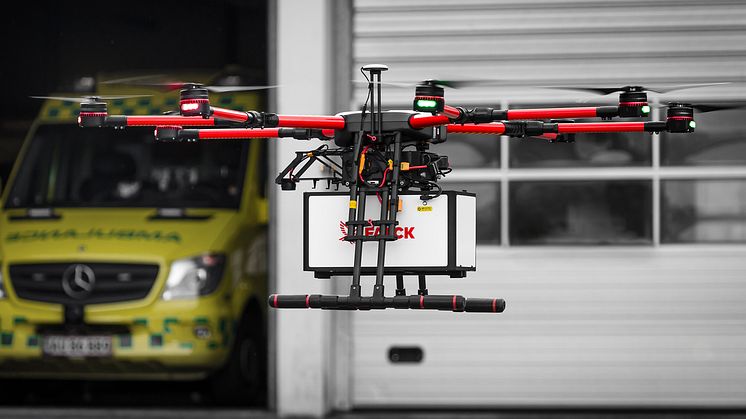
Press release -
Falck with new ambition: Paramedics in manned drones to save more lives
Falck will make manned drones an integral part of its fire and emergency medical services. Before 2025, the first citizens will be met by paramedics flying in drones. The technology is rapidly evolving. Next phase will be to gain concrete experience of how drones may be used in specific situations and to adjust legislation to allow drones to become part of everyday life.
Therefore, Falck is initiating its first test flights with unmanned drones on the Danish island of Funen and is working on establishing a partnership with a tech-partner with whom the company can carry out manned drone flights.
With the new technology, it is Falck’s ambition to save and improve lives among critically ill and injured patients. At the same time, the company sees perspective in the ability to respond with a single paramedic, who can assess whether an ambulance is needed.
The drone flying paramedics is one of several initiatives from Falck which will set the standard for how emergency medical services will look just ten years from now.
President and CEO Jakob Riis says:
”10-15 years ago, we created one of the world’s most sophisticated emergency medical services together with our customers. Today, an ambulance is an advanced point of treatment, a rolling clinic. Doctors and paramedics initiate the first treatment of critically ill and injured patients in the ambulance. Now, we are once again working on developing ambulance and health services to set the standard for emergency medical services in just ten years. We are developing new technology, medicine and treatments for our future ambulances. The challenge is that they will also be an expensive resource. That is why we see a need for a more flexible response, for example with a drone manned with a paramedic, who can assess the situation and request an ambulance if need be.”
New technology may solve more challenges in the healthcare system – Falck will discover how
The entire healthcare area faces fundamental changes in the coming years. Some of the main challenges will be more chronically ill patients and higher demands from citizens, healthcare professionals and decision-makers. At the same time, new forms of mobility such as self-driving cars and drones are emerging and will also change the emergency medical service area.
”It is a general assumption that drones will be one of several new ways of transportation no later than 2030. How we create more value from the new technology is an open question: Does the value lie in faster response time to e.g. patients with cardiac arrest so we can save and improve more lives? Does the value lie in better help to remote areas? Does the value lie in being able to treat more patients at home? Or in reducing the number of ambulance trips and thus save staff and money? We don’t know today, but now we will start to look into how the drone technology can and cannot be used,” says Jakob Riis.
Cooperation with tech-partners and Falck customers in Denmark or abroad
Today, Falck is in dialogue with several leading drone suppliers to find a tech-partner. For drone suppliers, Falck is interesting to work with because the company is present both in Europe, the US and Latin America. At the same time, the emergency response area is seen as a prioritised use case, when authorities worldwide are to give the first permissions to fly drones beyond visual line of sight and to fly with manned drones.
”Falck is not going to develop the technology, but will focus on adapting drones to emergency response. Our aim is to find out how and when the technology may be used in the future emergency response services. New technology is a way to get more healthcare for less money, and Falck is well-positioned to test and evaluate new technologies on a large scale. That requires global partnerships and implementation across national markets,” says Jakob Riis.
Falck continues the cooperation on health drones
Falck will unite its development and innovation initiatives in the drone area under the project ”Vertical”.
Since 2018, Falck has been part of the innovation project “HealthDrones” with Holo and Odense University Hospital. The project investigates how drones may be used for transportation of e.g. blood samples and medical equipment.
With Falck’s new and bigger ambition, the company will now also carry out its own flights. The goal is to gain experience with drones manned with e.g. paramedics. The existing cooperation with HealthDrones continues until 2022.
Falck expects to carry out the manned drone flights in cooperation with customers in either Denmark or abroad. Several customers have already expressed their interest. Falck expects to cooperate with one or more customers where the existing emergency medical services are at a high level and where customers’ readiness for development is high.
Read more about Falck’s ambitions for drone flights manned with paramedics
Categories
About Falck
We care for the well-being of people and excel in saving and improving lives of people in urgent need. This has made Falck an international leader in emergency response and healthcare.
For more than a century, Falck has worked with local and national governments to prevent accidents, diseases and emergency situations, to rescue and assist people in emergencies quickly and competently and to rehabilitate people after illness or injury.
Falck operates in 30 countries and has approximately 25,000 employees.
.

